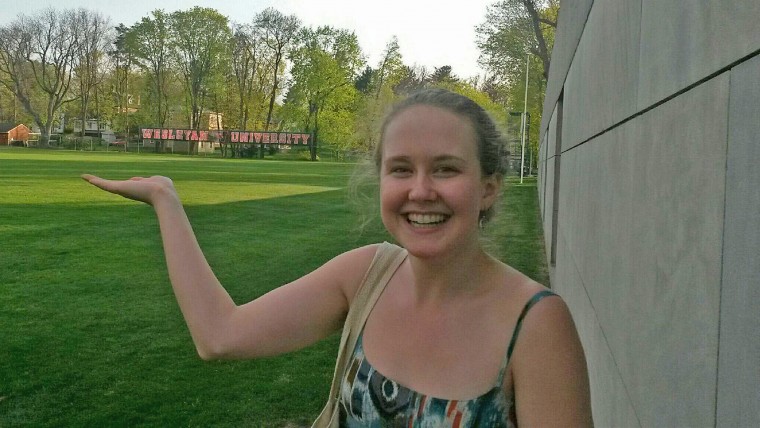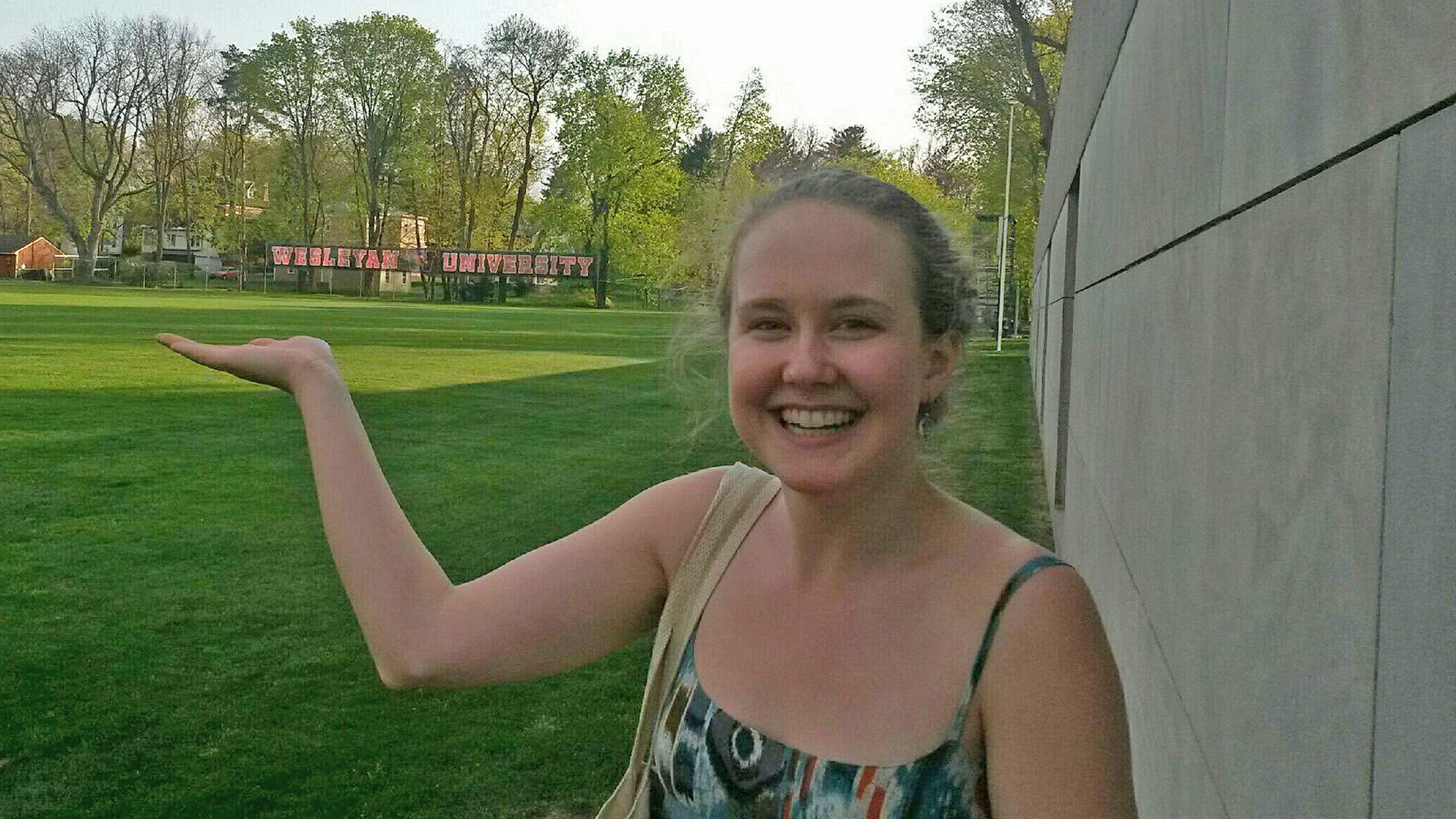Carr ’15 Explores Concept of “Little” in Children’s Literature


In this issue of News @ Wesleyan, we speak with Siri Carr ’15, who double majored in the College of Letters and Hispanic Literatures and Cultures. Carr’s thesis, Little Do We Know: Conceptualizing the “Little” in Children’s Literature, explores the concept of the “little” in children’s literature. The thesis was submitted for honors in the College of Letters.
Q: How did you choose your thesis subject?
A: The summer before junior year, I was thinking about what I could possibly write my thesis on. I really took to heart the advice that you should write about something you’ll be able to care about for an entire academic year. I had done a lot of babysitting that summer, so “children” was the first thing that came to mind. I’ve also always been an avid reader and I love literature, so I simply combined my two passions to come to the conclusion that I should study children’s literature.
Later that summer, I heard an interview with Maria Tatar, a leading scholar in the field of children’s literature who specializes in the study of fairytales. That interview confirmed the academic validity of studying children’s literature for my thesis, so I decided to enroll in Associate Professor of American Studies Indira Karamcheti’s children’s literature class, Childhood in America. While the class is quite popular and there was a huge waitlist, I persevered and received the professor’s permission to enroll.
Through that class, I was able to explore some of my ideas regarding the analysis of children’s literature, and I was inspired by an essay prompt that asked us to explain the significance of the “little” in Little House on the Prairie, Little Women, and A Little Princess. I was fascinated by how such a seemingly insignificant, extraneous word is so pervasive throughout the genre. I’ve always believed in the power of children and wanted to explore how and why we seek to define children as “little,” particularly in their literature. At the end of the semester, I shared the idea with several College of Letters professors, as well as with Professor Karamcheti, who supported the concept as a thesis subject and graciously agreed to be my thesis advisor.
Q: What did you find?
A: I found that the fact that we define children as “little” in their literature says much more about us as adults than it does about children. The “child” of children’s literature is truly an adult construction rather than a reality; we define who children are in their literature, hoping they will become the people we adults want them to be, and we pretend to know what children want or need in their literature based on our own ideas of who they are. Calling children “little” puts them always in relation to the adult: always small and young, always non-adult, and always “other.” This “little” label encapsulates children’s otherness in society by implying that children are weak, ignorant and powerless, but also exceptionally creative, curious and imaginative. As these connotations are based on adult nostalgia or didactic pressures to pass on social, moral and religious values, children’s literature serves as a social and cultural mirror, revealing to us the aspects of our society that we intentionally and unintentionally preserve in our children.
Q: Can you share an “ah-ha” moment from your research?
A: The most memorable moment actually occurred while I was talking with my advisor about my work. I had been writing too timidly and she told me, “You don’t have to think like a man, but you have to write like one.” Her words were particularly harsh to my feminist ears, but I know she meant them to be empowering. She wanted me to assert myself and to stop writing “maybe” or “perhaps”—to simply say what I needed to say without trying to accommodate my imagined future critics before I had even made any argument at all. My advisor rephrased her advice to say that I was used to being the student, but now I had to sound like the professor, and she acknowledged that it can be difficult for women in academia to assert themselves in that way. I am forever grateful to her for her advice, because it startled me into finding my voice as a writer and as a woman in academia.
Q: Do you have a favorite children’s book/author?
A: Yes, I’ve always loved Madeleine L’Engle’s A Wrinkle in Time series, with A Wind in the Door being my true favorite of the set. I did not choose to write about any of L’Engle’s books in my thesis, probably because they are so close to my heart that I needed to keep them away from my brain. However L’Engle’s assertion that she does not write children’s literature for children but rather for herself is a notion that stuck with me throughout my writing process.
Q: In your conclusion, you talk about how while children and the elderly share this littleness trait, our societal approach to each group differs dramatically. Can you explain?
A: Studying children’s literature reflects back to who we are and what we value. Studying the concept of littleness in particular is important because being “little” is a universal state of humanity: We enter the world as young, small, weak vulnerable beings and we return to that smaller, weaker state of being in our old age. In my conclusion, I discuss how adults fear this littleness. We describe the child in terms so different and separate from ourselves in order to emphasize that we are not little and are not the many powerless connotations that it entails. But if this littleness is a state that we all universally come from, it is inevitably a part of us and always will be.
As adults, we are scared of old age and the similar type of littleness that it entails. Our bodies will shrink, we will begin to forget what we once knew and we will become ignorant again—returning to the littleness. In the final paragraphs of my thesis, I ask us to look at how we treat children versus how we treat the elderly. Children and the elderly possess a shared littleness and thus a shared otherness in society due to their age difference and their varied physical, and even mental, capabilities. But in American society we embrace and accommodate children despite their littleness, while we send the elderly away to nursing homes where others are paid to deal with their littleness. I hope that by thinking about our conceptions of the “little” and our reasons for distancing ourselves as adults from that identity, we can acknowledge both our fear of it and its universal, important role in our life experience, so that we might approach the elderly with the same love with which we approach the “little” child.
Q: What other activities were you involved in during your time at Wesleyan?
At Wesleyan, I was the student coordinator for WesInterpreters, a student group that provides free Spanish-English/English-Spanish translation and interpretation services to the Middletown community, and for the Wesleyan-Gilead Alliance, a student group that pairs Wesleyan students with members of the Middletown community who have mental illness. As a violinist, I participated in various music theses, projects, musicals and bands on campus, and I taught elementary students in Middletown’s afterschool music program. I was also one of the founding leaders of the F Holes, a student-run chamber orchestra. In past years, I volunteered at Green Street Teaching and Learning Center’s and MacDonough Elementary School’s musical mentoring programs, and I was a caller for Red & Black for a period of time.
Q: Now that you’ve graduated, what are your post-Wesleyan plans?
This summer I’ll be moving to New York City to work for Columbia University’s Summer Programs for High School Students. In August, I’ll be moving to Boston to work as a tutor and teaching resident for Match Education at Match Middle School, and to pursue a master’s in teaching through the program’s grad school.

